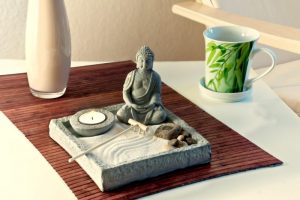The decoration and design of spaces is certainly not a prerogative of modernity alone. Public buildings have always played an important role in communicating the relationship between power and people. Through art or architecture, they have always, inevitably, transmitted the rulers’ worldview, structure and/or social values.
Likewise, private buildings have always been a means of expressing the identity of those who inhabit them, generally in line with the aesthetic tastes of their time. After all, ever since the house was a cave retreat, there has been a certain attention to art and beauty. What are cave paintings if not the first expressions of art and interior decoration and, in some cases, public?
THE INSTINCT TO DECORATE AND DESIGN OUR ENVIRONMENT
Of course, in the course of history, only a very small part of humanity could afford to hire artists, architects and decorators to beautify their home. But the search for harmony, order and beauty in the spaces that surround us is inherent to our human being and has always existed. Therefore, as far as possible, even ordinary people have always taken care to give the house a certain appearance, a face, a minimum of harmony and beauty.
Of course, the aesthetic aspect is predominant in the contemporary world and interior designers are now a figure whose employment is increasingly within the reach of many. But, in the past, harmony was never just a purely aesthetic issue. Furthermore, it is not even today, just not everyone is aware of it.
Aesthetics always contain ethics, whether we realize it or not. And the need for harmony is always an expression of an inner need.
In different traditions, it was used to orient buildings according to precise canons, not only utilitarian, but also “symbolic.” In the construction, location and orientation of sacred buildings, in particular, human beings have never limited themselves to following architectural and engineering criteria: on the contrary, architects and engineers had to strive to satisfy specific “spiritual” needs. Cities were founded following precise rites and, whenever possible, in places considered auspicious..
Needless to say, even in homes attention was paid to attracting positive energies. Think about the habit of not placing beds facing the exit. In short, it is about maintaining a “holistic” vision, looking at the whole between heaven and earth, nature and spiritual.
THE DOCTRINE OF FENG SHUI

In China, the doctrine of Feng Shui was born and consolidated on exactly these same foundations.
Expression of Taoism, Feng Shui is one of the five Arts of Chinese Metaphysics and deals with the analysis and balance of the so-called “invisible forces”.
Everything, even the inanimate, possesses, releases and attracts a certain energy. From the analysis of these energies, the doctrine of Feng Shui is concerned that man can achieve harmony with everything that surrounds him in space. It is no coincidence that Feng Shui comes from the name of two elements that most influence the formation of the world: wind (Feng) and water (Shui).
It is difficult to trace a precise history of Feng Shui. Some speak of centuries, others of a much longer oral tradition. However, a story related to Feng Shui takes us to the Yellow River, where the inhabitants of ancient China had to fight with “evil” winds and turbulent waters. Studying and listening to nature, considering the energy of the elements and things as something alive, which speaks to us, was and is the essence of this doctrine.
By the way, the existence of a record from the Han dynasty is proven in which the name of a scholar, Zhang Liang (230 BC -185 BC), appears in reference to the practice of Feng Shui.
Masters of this doctrine could invest decades to become Feng Shui masters, after having in turn been students, practitioners and assistants of a teacher recognized as such. This tells us a lot about the semi-religious status of these ancient sages, who later left behind knowledge and indications that will have extended even beyond the path of initiation into practice.
That is exactly why a sacred text, The Book of Mutations, is the basis of this doctrine, which is based on the principles of yin and yang and the great universal order. The eight trigrams derived from the interactions of the tao are the basis of the theories and the different schools of Feng Shui. Considering that the upper line represents the sky, the central line the man and the lower line the earth, the different schools have given emphasis to one or the other with different theoretical consequences. In the first case we concentrate on the orientation of things, in the second on interaction, in the third on the earth.
The essential terms to understand Feng Shui are two: Chi and Sha. Chi is vital energy, it is positive and moves gently and in an undulating way. Sha is his opposite: he moves rigidly, through straight lines and angles. Chi is the cosmic breath, it is life itself and perhaps we could dare to compare it with the Christian Holy Spirit. In Japan it is called Ki, in India Prana. It goes without saying that the goal of Feng Shui is to allow Chi to circulate freely, eliminate obstacles and energy “jams.”
HOW TO HARMONIZE THE ENERGY OF YOUR HOME
A tidy home is a home where positive energy flows. Few things, the important and useful ones, keep away the useless things that impede the circulation of energy and block the energies, keep away the things kept in dusty closets. The things that we do not find the courage to throw away are, after all, the things that imprison us, our “garbage” or our past.
Releasing and letting energies flow is something that requires the presence in the house only of the things that they have and to which we give life. The deposits are centers of blocked energies.
The feeling of well-being, warmth and hospitality starts from the entrance, free of impediments and perhaps welcoming guests with a symbolic object that attracts Chi energy. The doors will be free of obstacles, with nothing hidden behind them – doors are essential for the flow of energies. That is why it is important that nothing obstructs passage through the corridors. In the kitchen, eliminate unnecessary utensils and containers, look for light, healthy food and, of course, clean. In any case, avoid piling things up. In the living room, try to keep the energy flowing, without furniture near the door, without the television becoming the heart of a space that, on the contrary, should be the center of communication.
From the sofa you should be able to see the door, directly through a mirror.
In the bedroom, a place of intimacy, our personal sanctuary, it is even more important that the environment be bright. Avoid transforming the bottom of the bed or above the closet into a mini storage room, avoid accumulating work objects in the room, dirty clothes, electronic or mechanical objects (a bicycle for example). The bedroom should encourage the concentration of energy towards oneself or one’s partner.. To do this, if possible, it should be located as far as possible from the entrance door. With the bed in front of a window. Avoid lamps above the bed: a light lamp is best. More generally, at home, do not abuse artificial lights and technologies. For the walls, it is preferable to use neutral colors that promote a feeling of peace. Avoid windows facing each other. Windows are very important, because what we see contributes to our feeling of well-being. Fans are one of the elements considered Chi expanders. They can be placed on the walls, perhaps at the entrance, with adhesive materials, without nails. Likewise, it is useful to use amulets, candlesticks and incense to reactivate the energy of the house. Mirrors can also be useful for this purpose, but it is important to place them in a way that multiplies the vision of elements that are in themselves positive. Plants, of course, are widely used but, in this case, it is important to study the symbolism of each plant or flower. And of course, keep it fresh and alive.
In short, it is not just about designing, decorating, beautifying: it is about seeking peace. Thus Feng Shui reaches the roots of interior design.
Emmanuel Raffaele Maraziti

